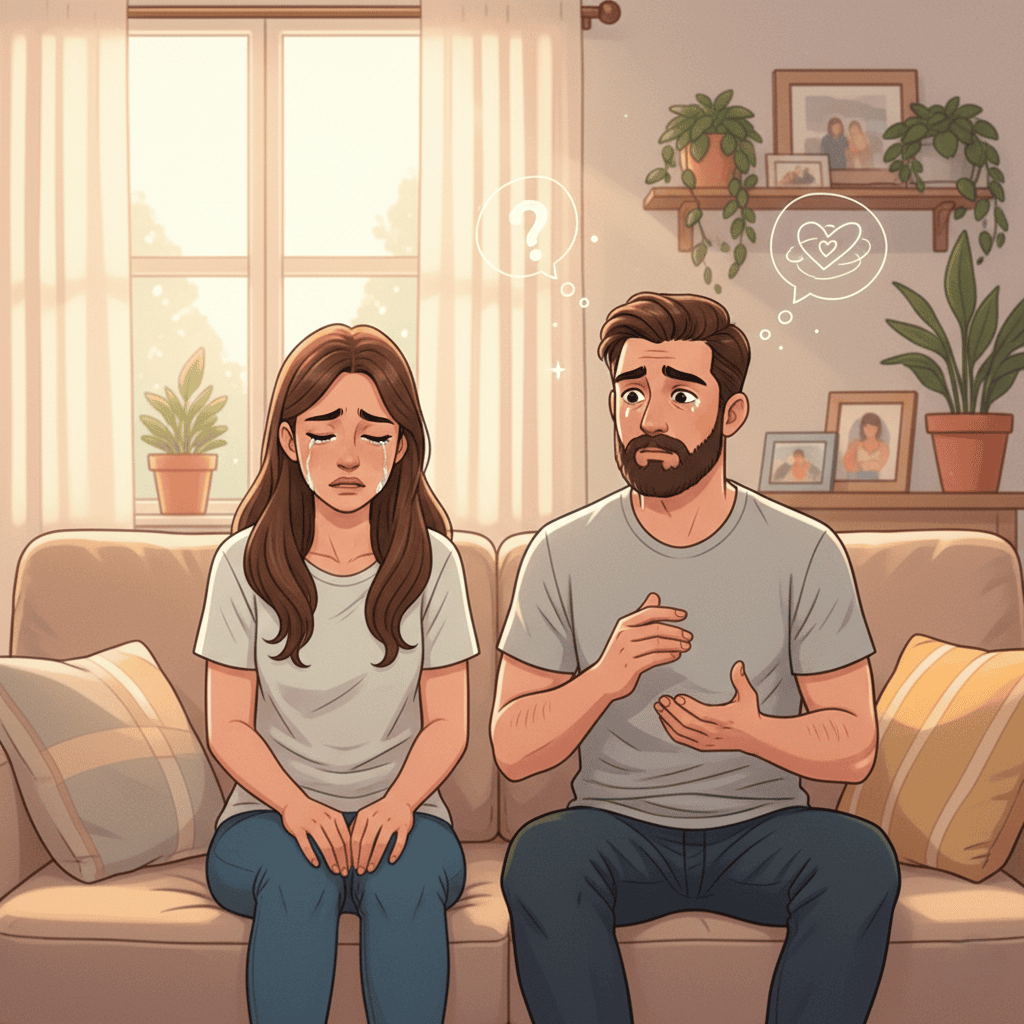Where Every Connection Becomes a Bond

You’re in the middle of telling him something important—something you’ve been building up the courage to say for weeks. Your voice starts shaking. Your eyes fill with tears. And then you see it: the shift in his face. The moment he stops listening to your words and starts judging your tears.
He might pull away. Roll his eyes. Tell you to “calm down” or “get it together.” Walk out of the room. Or worse—assume you’re manipulating him.
And suddenly, the fight isn’t about what you were trying to communicate anymore. It’s about the fact that you’re crying.
What you don’t realize is that your tears are triggering a complex biological and psychological response in him. He’s not thinking what you think he’s thinking. His brain is working in ways that don’t make logical sense to you—but understanding his internal experience might change how you both navigate conflict.
Let’s explore what’s actually happening in his mind when those tears appear.
1. He Feels Helpless and Uncomfortable
The first thing a man feels when a woman cries isn’t anger or annoyance. It’s discomfort so profound that his nervous system wants to escape.
Research shows that men have difficulty reading facial expressions on women’s faces. A German study found that when men were shown photographs of eyes and asked to identify the emotion, they could quickly interpret emotion in men’s eyes but were frequently baffled by women’s eyes.
So when you’re crying, he literally can’t read what you’re feeling. Are you angry? Hurt? Terrified? He doesn’t know. And that uncertainty creates anxiety in him.
Without knowing what’s wrong, he can’t fix it. And his brain is wired to want to fix things. So he feels helpless. And helpless men often respond with withdrawal.
2. He Wonders If You’re Manipulating Him
This is the thought that haunts him—and it’s not always fair, but it’s real.
One study quoted by the HuffPost found that many partners grow resentful of the crier and develop the belief that “tears are a conditioned manipulation to gain control of the disagreement.”
He’s not necessarily right to think this. Most of the time, your tears are genuine. But somewhere in his past—whether with his mother, an ex-girlfriend, or his own learned patterns—he might have experienced tears used as a weapon in arguments.
So even though your tears are authentic, he’s wondering if they are. And that doubt makes him defensive.
3. His Testosterone Levels Actually Drop
Here’s something fascinating from neuroscience: when men smell emotional tears from women, their testosterone levels fall.
Testosterone is what makes men feel powerful, competitive, and in control. It’s the “warrior hormone” that gets them in problem-solving mode. When a woman cries, even if he can’t consciously detect it, his body is experiencing a hormonal shift that makes him feel less powerful.
This isn’t in his head. It’s in his chemistry.
That drop in testosterone can trigger feelings of failure or emasculation. He goes from feeling like he can handle this conflict to feeling like he’s losing it. And that shift happens at a biological level he can’t control or even name.
4. He’s Wondering If the Fight Is Over or If It’s Getting Worse
Men often interpret tears as a sign that things have escalated beyond his tolerance for conflict.
If you’ve been having a relatively calm discussion and then tears appear, he reads that as: “This is now an emergency. I’ve gone too far. I need to get out of here before this gets even worse.”
He doesn’t understand that crying is just how you process conflict. He thinks it’s an escalation. So instead of continuing to engage with you, his instinct is to remove himself from the situation.
He’s not leaving because he doesn’t care. He’s leaving because he thinks the fight has changed and he doesn’t know how to handle it anymore.
5. He Feels Judged for Your Tears
On some level, he blames himself for making you cry. And that makes him defensive.
He thinks: “If I hadn’t said that, she wouldn’t be crying. Now I’m the bad guy. Now I’m the one who hurt her.”
This is especially true if he has any insecurity about being a “good partner.” He internalizes your emotional response as evidence of his failure. And instead of sitting with that uncomfortable feeling, he gets defensive or withdrawn.
He’s judging himself through the lens of your tears. And he doesn’t like what he sees.
6. He’s Questioning Whether You Can Handle Conflict
Fair or not, many men interpret a woman’s tears during an argument as a sign that she can’t handle disagreement or tension.
He might think: “She falls apart the second things get hard. How are we going to navigate real problems if she can’t even have this conversation?”
What he doesn’t understand is that tears aren’t a sign of weakness or inability to handle conflict. For many women, crying is how you metabolize big emotions so you can actually engage more deeply.
But he doesn’t have that framework. So he interprets your tears as fragility instead of emotional processing.
7. He’s Concerned You’re Going to Leave Him
If his attachment style is anxious, he’s spiraling right now.
Your tears trigger his deepest fear: abandonment. He’s wondering if you’re crying because you’re done. If your tears mean you’ve checked out of the relationship. If this is the beginning of the end.
Or conversely, if his attachment style is avoidant, he’s thinking: “She’s getting too emotional. This is too much. I need to distance myself before this gets worse.”
Either way, your tears are activating his attachment wounds, not just his rational brain. He’s responding from a place of relational fear, not logic.
8. He’s Wishing You’d Just Tell Him What You Need Instead
Underneath all of this, he’s frustrated.
You’re crying, but you’re not saying what you need. He has to guess. He has to manage both your emotions and the conflict. He feels like he’s supposed to know what to do, but he doesn’t have enough information.
He wants you to use words. He wants the problem stated clearly so he can help solve it.
This doesn’t mean your tears are wrong or unnecessary. But it does mean that after the tears, he needs clarity. He needs to know what you’re feeling, what triggered it, and what you need from him.
What This Means for You
Understanding what he’s experiencing doesn’t mean you should stop crying or suppress your emotions.
Crying is a legitimate form of emotional expression. It’s not weakness. It’s not manipulation. It’s processing.
But here’s what can help:
After the tears come, use words. Once you’ve had a moment to breathe and settle your nervous system, tell him what you’re feeling. “I’m crying because I feel unheard” or “I’m crying because I care about this” or “I’m crying because I’m scared.”
Let him know ahead of time that you cry during conflicts. Discuss this outside of a fight. Explain that your tears don’t mean you’re done, they don’t mean you’re manipulating, and they don’t mean you’re weak. They just mean you’re processing big emotions.
Take a break if you need one. It’s okay to pause the conversation, get a drink of water, take a walk, or sit in silence for 10 minutes. Let your nervous system settle. Then come back to it.
Help him understand that you’re not leaving. If abandonment is his fear, explicitly reassure him: “I’m not going anywhere. I’m just feeling a lot right now.”
Give him a role. Instead of leaving him helpless, tell him what you need: “I need you to sit with me” or “I need a hug” or “I need you to listen without trying to fix this.”
The Bigger Truth
Your tears aren’t the problem in your relationship. The problem is the gap in how you both understand what tears mean.
He’s interpreting your emotional response through his own lens—one that might be filtered through his attachment wounds, his family of origin, or his biological discomfort with emotional ambiguity.
You’re crying because the conflict matters to you. Because you care. Because you’re processing.
Once he understands this, your tears become less threatening and more connective. They become a sign that you care enough to get emotional, not a sign that you’re falling apart.
And once you understand his discomfort, you can bridge the gap with words and reassurance.
That’s when conflict becomes not a threat to your relationship, but an opportunity to deepen it.





